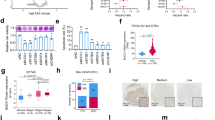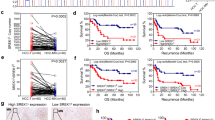Abstract
B7-H3, an important co-inhibitor, is abnormally highly expressed in a variety of malignancies. The antibodies targeting B7-H3 have exhibited beneficial therapeutic effects in clinical trials. Therefore, discovery of the regulatory factors in B7-H3 expression may provide new strategies for tumor therapy. Here, we investigated the splicing factors involved in the splicing of B7-H3. By individual knockdown of the splicing factors in colorectal cancer (CRC) cells, we found that B7-H3 expression was markedly inhibited by SRSF3 and SRSF8, especially SRSF3. Then we found that both SRSF3 and B7-H3 were highly expressed in CRC tissues. Moreover, high-expression of either SRSF3 or B7-H3 was significantly correlated with poor prognosis of patients. The expression of B7-H3 mRNA and protein were evidently reduced by SRSF3 silence, but were enhanced by overexpression of SRSF3 in both HCT-116 and HCT-8 cells. The results from the RNA immunoprecipitation (RIP) assays demonstrated that SRSF3 protein directly binds to B7-H3 mRNA. In addition, we constructed a minigene recombinant plasmid for expressing B7-H3 exons 3–6. We found that SRSF3 contributed to the retention of B7-H3 exon 4. These findings demonstrate that SRSF3 involves in the splicing of B7-H3 by directly binding to its exon 4 and/or 6. It may provide novel insights into the regulatory mechanisms of B7-H3 expression and potential strategies for the treatment of CRC.




Similar content being viewed by others
References
Bray F, Ferlay J, Soerjomataram I, Siegel RL, Torre LA, Jemal A (2018) Global cancer statistics 2018: GLOBOCAN estimates of incidence and mortality worldwide for 36 cancers in 185 countries. CA 68:394–424. https://doi.org/10.3322/caac.21492
Gessani S, Belardelli F (2019) Immune dysfunctions and immunotherapy in colorectal cancer: the role of dendritic cells. Cancers. https://doi.org/10.3390/cancers11101491
Thanikachalam K, Khan G (2019) Colorectal cancer and nutrition. Nutrients. https://doi.org/10.3390/nu11010164
Bailey CE, Hu CY, You YN, Bednarski BK, Rodriguez-Bigas MA, Skibber JM, Cantor SB, Chang GJ (2015) Increasing disparities in the age-related incidences of colon and rectal cancers in the United States, 1975–2010. JAMA Surg 150:17–22. https://doi.org/10.1001/jamasurg.2014.1756
Messersmith WA (2019) NCCN guidelines updates: management of metastatic colorectal cancer. J Natl Comprehensive Cancer Netw 17:599–601. https://doi.org/10.6004/jnccn.2019.5014
Spartalis C, Schmidt EM, Elmasry M, Schulz GB, Kirchner T, Horst D (2019) In vivo effects of chemotherapy on oncogenic pathways in colorectal cancer. Cancer Sci 110:2529–2539. https://doi.org/10.1111/cas.14077
Torring ML, Falborg AZ, Jensen H, Neal RD, Weller D, Reguilon I, Menon U, Vedsted P (2019) Advanced-stage cancer and time to diagnosis: an international cancer benchmarking partnership (ICBP) cross-sectional study. Eur J Cancer Care 28:e13100. https://doi.org/10.1111/ecc.13100
Jiao Q, Ren Y, Ariston Gabrie AN, Wang Q, Wang Y, Du L, Liu X, Wang C, Wang YS (2020) Advances of immune checkpoints in colorectal cancer treatment. Biomedicine & pharmacotherapy = Biomedecine & pharmacotherapie. 123:109745. https://doi.org/10.1016/j.biopha.2019.109745
Janakiram M, Shah UA, Liu W, Zhao A, Schoenberg MP, Zang X (2017) The third group of the B7-CD28 immune checkpoint family: HHLA2, TMIGD2, B7x, and B7–H3. Immunol Rev 276:26–39. https://doi.org/10.1111/imr.12521
Pollizzi KN, Powell JD (2014) Integrating canonical and metabolic signalling programmes in the regulation of T cell responses. Nat Rev Immunol 14:435–446. https://doi.org/10.1038/nri3701
Driessens G, Kline J, Gajewski TF (2009) Costimulatory and coinhibitory receptors in anti-tumor immunity. Immunol Rev 229:126–44. https://doi.org/10.1111/j.1600-065X.2009.00771.x
Seliger B, Quandt D (2012) The expression, function, and clinical relevance of B7 family members in cancer. Cancer Immunol Immunother 61:1327–1341. https://doi.org/10.1007/s00262-012-1293-6
Chen L, Flies DB (2013) Molecular mechanisms of T cell co-stimulation and co-inhibition. Nat Rev Immunol 13:227–242. https://doi.org/10.1038/nri3405
Picarda E, Ohaegbulam KC, Zang X (2016) Molecular pathways: targeting B7–H3 (CD276) for human cancer immunotherapy. Clin Cancer Res 22:3425–3431. https://doi.org/10.1158/1078-0432.Ccr-15-2428
Chapoval AI, Ni J, Lau JS et al (2001) B7–H3: a co stimulatory molecule for T cell activation and IFN-gamma production. Nat Immunol 2:269–274. https://doi.org/10.1038/85339
Pardoll DM (2012) The blockade of immune checkpoints in cancer immunotherapy. Nat Rev Cancer 12:252–264. https://doi.org/10.1038/nrc3239
Zhang T, Wang F, Wu JY et al (2018) Clinical correlation of B7–H3 and B3GALT4 with the prognosis of colorectal cancer. World J Gastroenterol 24:3538–3546. https://doi.org/10.3748/wjg.v24.i31.3538
Jiang B, Zhang T, Liu F, Sun Z, Shi H, Hua D, Yang C (2016) The co-stimulatory molecule B7–H3 promotes the epithelial-mesenchymal transition in colorectal cancer. Oncotarget 7:31755–31771. https://doi.org/10.18632/oncotarget.9035
Zang X, Thompson RH, Al-Ahmadie HA, Serio AM, Reuter VE, Eastham JA, Scardino PT, Sharma P, Allison JP (2007) B7–H3 and B7x are highly expressed in human prostate cancer and associated with disease spread and poor outcome. Proc Natl Acad Sci USA 104:19458–19463. https://doi.org/10.1073/pnas.0709802104
Li G, Quan Y, Che F, Wang L (2018) B7–H3 in tumors: friend or foe for tumor immunity? Cancer Chemother Pharmacol 81:245–253. https://doi.org/10.1007/s00280-017-3508-1
Nilsen TW, Graveley BR (2010) Expansion of the eukaryotic proteome by alternative splicing. Nature 463:457–463. https://doi.org/10.1038/nature08909
Wang ET, Sandberg R, Luo S, Khrebtukova I, Zhang L, Mayr C, Kingsmore SF, Schroth GP, Burge CB (2008) Alternative isoform regulation in human tissue transcriptomes. Nature 456:470–476. https://doi.org/10.1038/nature07509
Song X, Wan X, Huang T et al (2019) SRSF3-regulated RNA alternative splicing promotes glioblastoma tumorigenicity by affecting multiple cellular processes. Can Res 79:5288–5301. https://doi.org/10.1158/0008-5472.Can-19-1504
Lee Y, Rio DC (2015) Mechanisms and regulation of alternative pre-mRNA splicing. Annu Rev Biochem 84:291–323. https://doi.org/10.1146/annurev-biochem-060614-034316
He C, Zhou F, Zuo Z, Cheng H, Zhou R (2009) A global view of cancer-specific transcript variants by subtractive transcriptome-wide analysis. PLoS ONE 4:e4732. https://doi.org/10.1371/journal.pone.0004732
Zhang J, Manley JL (2013) Misregulation of pre-mRNA alternative splicing in cancer. Cancer Discov 3:1228–1237. https://doi.org/10.1158/2159-8290.Cd-13-0253
Koedoot E, Wolters L, van de Water B, Devedec SEL (2019) Splicing regulatory factors in breast cancer hallmarks and disease progression. Oncotarget 10:6021–6037. https://doi.org/10.18632/oncotarget.27215
Chen J, Weiss WA (2015) Alternative splicing in cancer: implications for biology and therapy. Oncogene 34:1–14. https://doi.org/10.1038/onc.2013.570
Cohen-Eliav M, Golan-Gerstl R, Siegfried Z, Andersen CL, Thorsen K, Orntoft TF, Mu D, Karni R (2013) The splicing factor SRSF6 is amplified and is an oncoprotein in lung and colon cancers. J Pathol 229:630–639. https://doi.org/10.1002/path.4129
Das S, Anczukow O, Akerman M, Krainer AR (2012) Oncogenic splicing factor SRSF1 is a critical transcriptional target of MYC. Cell Rep 1:110–117. https://doi.org/10.1016/j.celrep.2011.12.001
Park WC, Kim HR, Kang DB et al (2016) Comparative expression patterns and diagnostic efficacies of SR splicing factors and HNRNPA1 in gastric and colorectal cancer. BMC Cancer 16:358. https://doi.org/10.1186/s12885-016-2387-x
Shi X, Zhang Y, Cao B et al (2013) Genes involved in the transition from normal epithelium to intraepithelial neoplasia are associated with colorectal cancer patient survival. Biochem Biophys Res Commun 435:282–288. https://doi.org/10.1016/j.bbrc.2013.04.063
Tsukamoto S, Ishikawa T, Iida S, Ishiguro M, Mogushi K, Mizushima H, Uetake H, Tanaka H, Sugihara K (2011) Clinical significance of osteoprotegerin expression in human colorectal cancer. Clin Cancer Res 17:2444–2450. https://doi.org/10.1158/1078-0432.CCR-10-2884
Khamas A, Ishikawa T, Shimokawa K et al (2012) Screening for epigenetically masked genes in colorectal cancer Using 5-Aza-2'-deoxycytidine, microarray and gene expression profile. Cancer Genomics Proteomics 9:67–75
Kurokawa K, Akaike Y, Masuda K, Kuwano Y, Nishida K, Yamagishi N, Kajita K, Tanahashi T, Rokutan K (2014) Downregulation of serine/arginine-rich splicing factor 3 induces G1 cell cycle arrest and apoptosis in colon cancer cells. Oncogene 33:1407–1417. https://doi.org/10.1038/onc.2013.86
Wang H, Zhang CZ, Lu SX et al (2019) A coiled-coil domain containing 50 splice variant is modulated by serine/arginine-rich splicing factor 3 and promotes hepatocellular carcinoma in mice by the Ras signaling pathway. Hepatology 69:179–195. https://doi.org/10.1002/hep.30147
Ganesh K, Stadler ZK, Cercek A, Mendelsohn RB, Shia J, Segal NH, Diaz LA Jr (2019) Immunotherapy in colorectal cancer: rationale, challenges and potential. Nature reviews. Gastroenterol Hepatol 16:361–375. https://doi.org/10.1038/s41575-019-0126-x
Kreidieh M, Mukherji D, Temraz S, Shamseddine A (2020) Expanding the scope of immunotherapy in colorectal cancer: current clinical approaches and future directions. BioMed Res Int 2020:9037217. https://doi.org/10.1155/2020/9037217
Emambux S, Tachon G, Junca A, Tougeron D (2018) Results and challenges of immune checkpoint inhibitors in colorectal cancer. Expert Opin Biol Ther 18:561–573. https://doi.org/10.1080/14712598.2018.1445222
Zhao J, Meng Z, Xie C et al (2019) B7–H3 is regulated by BRD4 and promotes TLR4 expression in pancreatic ductal adenocarcinoma. Int J Biochem Cell Biol 108:84–91. https://doi.org/10.1016/j.biocel.2019.01.011
Zhang P, Yu S, Li H et al (2015) ILT4 drives B7–H3 expression via PI3K/AKT/mTOR signalling and ILT4/B7-H3 co-expression correlates with poor prognosis in non-small cell lung cancer. FEBS Lett 589:2248–2256. https://doi.org/10.1016/j.febslet.2015.06.037
Purvis IJ, Avilala J, Guda MR, Venkataraman S, Vibhakar R, Tsung AJ, Velpula KK, Asuthkar S (2019) Role of MYC-miR-29-B7-H3 in medulloblastoma growth and angiogenesis. J Clin Med. https://doi.org/10.3390/jcm8081158
Zhou X, Mao Y, Zhu J et al (2016) TGF-beta1 promotes colorectal cancer immune escape by elevating B7–H3 and B7–H4 via the miR-155/miR-143 axis. Oncotarget 7:67196–67211. https://doi.org/10.18632/oncotarget.11950
Chen C, Zhu YB, Qu QX, Ge Y, Huang JA, Wang Y, Zhang XG (2009) CD40-activated apoptotic tumor cell-pulsed dendritic cell could potentially elicit antitumor immune response: involvement of up-regulation of B7–H3 expression. J Immunother 32:29–35. https://doi.org/10.1097/CJI.0b013e31818c8816
Inamura K, Amori G, Yuasa T, Yamamoto S, Yonese J, Ishikawa Y (2019) Relationship of B7–H3 expression in tumor cells and tumor vasculature with FOXP3+ regulatory T cells in renal cell carcinoma. Cancer Manag Res 11:7021–7030. https://doi.org/10.2147/CMAR.S209205
Lina TT, Gonzalez J, Pinchuk IV, Beswick EJ, Reyes VE (2019) Helicobacter pylori elicits B7H3 expression on gastric epithelial cells: implications in local T cell regulation and subset development during infection. Clin Oncol Res. https://doi.org/10.31487/j.cor.2019.05.05
Kuranaga Y, Sugito N, Shinohara H, Tsujino T, Taniguchi K, Komura K, Ito Y, Soga T, Akao Y (2018) SRSF3, a splicer of the PKM gene, regulates cell growth and maintenance of cancer-specific energy metabolism in colon cancer cells. Int J Mol Sci. https://doi.org/10.3390/ijms19103012
Lin JC, Lee YC, Tan TH, Liang YC, Chuang HC, Fann YC, Johnson KR, Lin YJ (2018) RBM4-SRSF3-MAP4K4 splicing cascade modulates the metastatic signature of colorectal cancer cell. Biochimica et biophysica acta. Mol Cell Res 1865:259–272. https://doi.org/10.1016/j.bbamcr.2017.11.005
Corbo C, Orrù S, Salvatore F (2013) SRp20: An overview of its role in human diseases. Biochem Biophys Res Commun 436(1):1–5
Funding
This research was supported by the National Natural Science Foundation of China (No. 81773044), Science and Technology Special Project of Clinical Medicine in Jiangsu Province (BL2014046), Social Development Project of Jiangsu Province (BE2019657), Qinglan Project of Jiangsu Province, and the Priority Academic Program Development of Jiangsu Higher Education Institutions (PAPD).
Author information
Authors and Affiliations
Contributions
WPW and CWC conceived the idea and directed the study. ZCX, CYS, LFC, CWC, and WPW designed the experiments and wrote the manuscript. ZCX, CYS, LFC, MY, FYM, and ZYW performed experiments. ZCX, CYS, and LFC analyzed the data. ZCX, CYS, LFC, CWC, and WPW generated figures. CWC and WPW critically revised the manuscript for important intellectual content.
Corresponding authors
Ethics declarations
Conflict of interest
The authors declare no conflict of interest.
Ethical approval
All procedures performed in studies involving human participants were in accordance with the ethical standards of the ethics committee of Soochow University (No.IRB-29-20120512H) and with the 1964 Helsinki Declaration and its later amendments or comparable ethical standards.
Informed consent
Informed consent was obtained from all individual participants included in the study.
Additional information
Publisher's Note
Springer Nature remains neutral with regard to jurisdictional claims in published maps and institutional affiliations.
Electronic supplementary material
Below is the link to the electronic supplementary material.
Rights and permissions
About this article
Cite this article
Zhang, C., Chen, Y., Li, F. et al. B7-H3 is spliced by SRSF3 in colorectal cancer. Cancer Immunol Immunother 70, 311–321 (2021). https://doi.org/10.1007/s00262-020-02683-9
Received:
Accepted:
Published:
Issue Date:
DOI: https://doi.org/10.1007/s00262-020-02683-9




